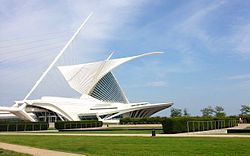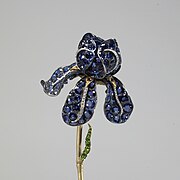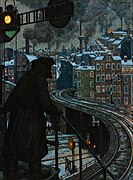Milwaukee Art Museum
 Milwaukee Art Museum | |
 Interactive fullscreen map | |
| Established | 1882 |
|---|---|
| Location | 700 N. Art Museum Drive Milwaukee, Wisconsin |
| Coordinates | 43°2′24″N 87°53′49″W / 43.04000°N 87.89694°W |
| Type | Art museum |
| Visitors | 400,000+ |
| Director | Marcelle Polednik |
| Public transit access | |
| Website | www |
The Milwaukee Art Museum (MAM) is an art museum in Milwaukee, Wisconsin. Its collection of over 34,000 works of art and total gallery space of 150,000 sq. ft. make it the largest art museum in the state of Wisconsin and one of the largest art museums in the United States.[1][2][3]
Location and visit
[edit]Located on the lakefront of Lake Michigan, the Milwaukee Art Museum is one of the largest art museums in the Midwestern United States. Aside from its galleries, the museum includes a cafe, named Cafe Calatrava, overlooking Lake Michigan, and a gift shop.[4]
Hours
[edit]Normal operating hours for MAM are Tuesday–Wednesday and Friday–Sunday 10:00 a.m. to 5:00 p.m., Thursday 10:00 a.m. to 8:00 p.m.[4][5]
History
[edit]Origins
[edit]
Beginning around 1872, multiple organizations were founded in order to bring an art gallery to Milwaukee, as the city was still a growing port town with few or no facilities to hold major art exhibitions. Over the span of at least nine years, all attempts to build a major art gallery had failed. Shortly after, Alexander Mitchell donated all of his collection in support of constructing Milwaukee's first permanent art gallery.[6]
In 1888, the Milwaukee Art Association was created by a group of German panorama artists and local businessmen. The same year, British-born businessman Frederick Layton built, endowed and provided artwork for the Layton Art Gallery, now demolished. In 1911, the Milwaukee Art Institute, another building constructed to hold other exhibitions and collections, was completed, adjacent to the Layton Art Gallery.
The claim of the Milwaukee Art Institute to be Milwaukee's first art gallery was disputed by the Layton Art Gallery, which opened the same year, 1888.[7] Nevertheless, in 1957, the Milwaukee Art Institute and Layton Art Gallery merged their collections to form the Milwaukee Art Center, now the Milwaukee Art Museum, and moved into the newly-built Eero Saarinen-designed Milwaukee County War Memorial.
Architecture
[edit]Quadracci
[edit]The Quadracci Pavilion is a multi-purpose 13,197-square-meter (142,050-square-foot) building with areas that include a reception hall, auditorium, exhibition space, and stores. It was designed by Spanish architect Santiago Calatrava and completed in 2001.[8] The construction method of concrete slabs into timber frames was revolutionary in architecture. Windover Hall is a 90-foot (27 m)-tall grand reception area topped with a glass roof. The style and symbolism of the building are based on Gothic architecture and designed to represent the shape of a ship looking over Lake Michigan. Calatrava states, “the building’s form is at once formal (completing the composition), functional (controlling the level of light), symbolic (opening to welcome visitors), and iconic (creating a memorable image for the Museum and the city).”[5]
Kahler and Calatrava Buildings
[edit]In the latter half of the 20th century, the museum came to include the War Memorial Center in 1957 as well as the brutalist Kahler Building (1975) designed by David Kahler and the Quadracci Pavilion (2001) created by Spanish architect Santiago Calatrava.[5]
The Quadracci Pavilion contains a movable, wing-like Burke brise soleil that opens up for a wingspan of 217 feet (66 m) during the day, folding over the tall, arched structure at night or during inclement weather. There are sensors on the wings that monitor wind speeds, so if the wind speeds are over 23 miles per hour (37 km/h) for over 3 seconds, the wings close. The pavilion received the 2004 Outstanding Structure Award from the International Association for Bridge and Structural Engineering.[9] This iconic building, often referred to as "the Calatrava", is used in the museum logo. The addition brought the total size of the museum to 341,000 square feet.[2]
-
Central vestibule of the Milwaukee Art Museum
-
The Reiman Bridge provides pedestrian access to downtown Milwaukee
-
Milwaukee Art Museum with the Burke brise soleil closed
2015 Shields Building
[edit]In November 2015, the museum opened a $34 million expansion funded jointly by a museum capital campaign and by Milwaukee County.[10] The new expansion, called the Shields Building, designed by Milwaukee architect James Shields of HGA, provides an additional 30,000 square feet for art, including a section devoted to light-based media, photography, and video installations.[11] The building includes a new atrium and lakefront-facing entry point for visitors and was designed with cantilevered elements and concrete columns to complement, respectively, the existing Calatrava and Kahler structures on the site.[12] The final design emerged after a lengthy process that included the main architect's departure because of design disputes and his return to the project.[13]
Cudahy Gardens
[edit]The Cudahy Gardens were designed in conjunction with the Quadracci Pavilion by landscape architect Dan Kiley. This garden measures 600 feet by 100 feet, a rectangular shape that is divided into five lawns by a series of 10-foot-tall hedge lines. In this garden there is a center fountain that creates a 4-foot-tall water curtain. There are linden trees and crabapple trees scattered throughout this garden as well. The gardens were named after philanthropist Michael Cudahy, whose donations greatly contributed to their construction.[5]
Collection
[edit]The museum houses over 34,000 works of art housed on four floors, with works from antiquity to the present. Included in the collection are 15th- to 20th-century European and 17th- to 20th-century American paintings, sculpture, prints, drawings, decorative arts, photographs, and folk and self-taught art. Among the best in the collection are the museum's holding of American decorative arts, German Expressionism, folk and Haitian art, and American art after 1960.[14][15][16]
The museum holds one of the largest collections of works by Wisconsin native Georgia O'Keeffe.[17][18][19] Other artists represented include Gustave Caillebotte, Nardo di Cione, Francisco de Zurbarán, Jean-Honoré Fragonard, Winslow Homer, Auguste Rodin, Edgar Degas, Claude Monet, Gabriele Münter, Henri de Toulouse-Lautrec, Frank Lloyd Wright, Pablo Picasso, Joan Miró, Wassily Kandinsky, Mark Rothko, Robert Gober, and Andy Warhol.
It also has paintings by European painters Francesco Botticini, Jan Swart van Groningen, Ferdinand Bol, Jan van Goyen, Hendrick Van Vliet, Franz von Lenbach (Bavarian Girl), Ferdinand Waldmüller (Interruption), Carl Spitzweg, William-Adolphe Bouguereau, Jean-Léon Gérôme (2 Majesties), Gustave Caillebotte, Camille Pissarro, Alfred Kowalski (Winter in Russia), Jules Bastien-Lepage (The Wood Gatherer), and Max Pechstein.[20][21][22][23][24][25][26][27][28][29]
Gallery
[edit]-
A Rus Kolty Pendant, 12th Century
-
Albert Bierstadt, Grizzly Bears, c. 1859
-
Robert S. Duncanson, Minneopa Falls, 1862
-
Carl Spitzweg, Scholar of Natural Sciences, 1875-80
-
Elihu Vedder, Star of Bethlehem, 1879-80
-
Winslow Homer, Hark! The Lark, 1882
-
Jean-Léon Gérôme, The Two Majesties (Les Deux Majestés), 1883
-
William Merritt Chase, Gathering Wild Flowers, c. 1895
-
Claude Monet, Waterloo Bridge, 1900
-
Frank Lloyd Wright, Tree of Life window, from the Darwin D. Martin House, in Buffalo, New York, 1904
-
Ernst Ludwig Kirchner, Dodo with a Feather Hat (Dodo mit Federhut), 1911
-
Tiffany & Co., Iris corsage ornament
-
Georgia O'Keeffe, The Flag, 1918
-
Hans Baluschek, City of Workers (or Working-Class City), 1920
-
Andy Warhol, Campbell's Soup Cans, 1965
-
The Layton Art Gallery
-
20th and 21st Century Design, Postwar Domestic Modernism in America
Governance
[edit]Management
[edit]Directors
- 1977–1985 Gerald Nordland
- 1985–2002 Russell Bowman[30]
- 2002–2008 David Gordon – director and CEO[31]
- 2008–2016 Daniel Keegan
- 2016 Marcelle Polednik – Donna and Donald Baumgartner director
Funding
[edit]As of 2015, the museum’s endowment is around $65 million.[32] Endowment proceeds cover a fraction of the museum's expenses, leaving it overly dependent on funds from day-to-day operations such as ticket sales.[33] Daniel Keegan, who has served as the museum's director since 2008, negotiated an agreement with Milwaukee County and the Milwaukee County War Memorial for the long-term management and funding of the facilities in 2013.[34] In 2024, a $3.54 million gift helped establish an endowment to make admission to the museum free for children aged 12 and under.[35]
Controversy
[edit]In June 2015 the museum's display of a work depicting Benedict XVI, composed of 17,000 latex condoms, created outrage among Catholics and others.[36]
In popular culture
[edit]The Quadracci Pavilion has an appearance in the 2008 EA racing video game Need for Speed: Undercover,[37] as well as the film Transformers: Dark of the Moon.[38][39]
The pavilion is also prominently featured in the episode “Joe Pera Shows You How to Do Good Fashion” in “Joe Pera Talks with You”.
See also
[edit]- Argo, a sculpture on the grounds
- The Calling, a sculpture in the Museum's collection on adjacent O'Donnell Park
- List of largest art museums
References
[edit]- ^ "Milwaukee Art Museum Annual Report 2023" (PDF). www.mam.org. Retrieved 2025-01-25.
- ^ a b "History". www.mam.org. Retrieved 2025-01-23.
- ^ "Reimagined Milwaukee Art Museum". www.mam.org. Retrieved 2025-01-25.
- ^ a b "Milwaukee Art Museum – Museum Review". Condé Nast Traveler. Retrieved 2022-04-29.
- ^ a b c d Museum, Milwaukee Art. "Visit | Milwaukee Art Museum". mam.org. Retrieved 2022-04-29.
- ^ Conrad, Howard Lewis (1895). History of Milwaukee County: From Its First Settlement to the Year 1895, Volume 2. Milwaukee, WI: American Biographical Publishing Company. pp. 88–90.
- ^ Barry Adams (29 November 2015). "On Wisconsin: Like its director, the Milwaukee Art Museum is transformed". Wisconsin State Journal. Retrieved 17 June 2017.
- ^ Rovito, Rich (2022-05-04). "Calatrava Revisits His Iconic Milwaukee Design, 20+ Years Later". Milwaukee Magazine. Retrieved 2024-11-12.
- ^ "Milwaukee Art Museum Addition, Milwaukee, Wisconsin". International Association for Bridge and Structural Engineering. Archived from the original on February 28, 2018. Retrieved January 31, 2018.
- ^ Kilmer, Graham (16 November 2015). "Milwaukee Art Museum Unveils New Addition". Urban Milwaukee. Retrieved 24 November 2015.
- ^ "New Building Opens at Milwaukee Art Museum". The New York Times. 23 November 2015. Retrieved 24 November 2015.
- ^ Schumacher, Maey Louise. "Milwaukee Art Museum's new lakefront atrium a gracious, rugged success". Milwaukee Journal-Sentinel. Retrieved 24 November 2015.
- ^ Murphy, Bruce (17 November 2015). "Still Controversy Over Art Museum Addition". Urban Milwaukee. Retrieved 24 November 2015.
- ^ Sarah Hauer (17 February 2017). "Art museum's Haitian collection explores spirituality, history, daily life". Milwaukee Journal-Sentinel. Retrieved 16 June 2018.
- ^ "Milwaukee Art Museum". Atlas Obscura. Retrieved 16 June 2018.
- ^ Chris Foran (19 October 2016). "Dark shadows overtake Milwaukee Art Museum". Milwaukee Journal-Sentinel. Retrieved 16 June 2018.
- ^ Kate Silver (9 August 2017). "Things to do in Milwaukee". The Washington Post. Retrieved 16 June 2018.
- ^ Mary Bergin (6 December 2015). "Milwaukee Art Museum gets new look with $34 million overhaul". Eau Claire Leader-Telegram. Retrieved 16 June 2018.
- ^ Amy Bertrand (22 October 2017). "Milwaukee: More than just beer here". St. Louis Post-Dispatch. Retrieved 16 June 2018.
- ^ Goldstein, Rosalie (1986). Guide to the permanent collection. Milwaukee: The Museum. p. 248.
- ^ "Triptych with Josiah and the Book of the Law, The Adoration of the Golden Calf and The Transfiguration of Christ and by anonymous artist of the 16th century Netherlands". RDK. 9 November 2015. Retrieved 28 June 2018.
- ^ D'Alessandro, Stephanie (2003). German Expressionist Prints: The Marcia Granvil Specks Collection. Milwaukee: Hudson Hills Press. p. 11. ISBN 0-944110-94-0.
- ^ The Bulletin of the Cleveland Museum of Art. Cleveland: Cleveland Museum of Art. 1994. p. 15.
- ^ Mary Louis Schumacher (21 April 2014). "Milwaukee Public Library may sell famous 'Bookworm' painting by Carl Spitzweg". Milwaukee Journal-Sentinel. Retrieved 28 June 2018.
- ^ Lardinois, A. P. M. H. (2006). Land of Dreams: Greek and Latin Studies in Honour of A.H.M. Kessels. Michigan: Brill. p. 248. ISBN 9789004150614.
- ^ Cass, Jeff (2008). Romantic Border Crossings. Hampshire: Ashgate Publishing Ltd. ISBN 978-0-7546-6051-4.
- ^ Brodskaïa, Nathalia (2018). Gustave Caillebotte (1848-1894). Parkstone International. ISBN 9781683256939.
- ^ Sharp, William (1914), The Bay View Magazine, Volume 22, Detroit, MI: Bay View Reading Circle, p. 352
- ^ Morrison, John (2014). Painting Labour in Scotland and Europe, 1850-1900. London: Ashgate Publishing. ISBN 9781472415196.
- ^ "Russell Bowman Fine Art, www.bowmanart.com". www.bowmanart.com.
- ^ "Milwaukee Art Museum | Pressroom". Mam.org. 2007-02-19. Retrieved 2017-01-06.
- ^ Ted Loos (December 28, 2015), Milwaukee Art Museum Reinvigorates With Renovations The New York Times.
- ^ Mary Louise Schumacher (October 28, 2011), Milwaukee Art Museum expansion began under Bowman Milwaukee Journal Sentinel.
- ^ Mary Louise Schumacher (October 23, 2015), Dan Keegan to leave Milwaukee Art Museum in May Milwaukee Journal Sentinel.
- ^ Rich Rovito (December 3, 2024), A Donation Guarantees Admission for Children Will Be Free at Milwaukee Art Museum Milwaukee Magazine.
- ^ Johnson, Annysa (2015-06-29). "Milwaukee Art Museum's embrace of condom portrait of pope draws disgust". Jsonline.com. Retrieved 2017-01-06.
- ^ "Need for Speed: Undercover (2008) Game Screenshot – Imgur", retrieved 2022-09-24
- ^ Miller, Anna. "11 of Milwaukee's Most Famous Filming Locations". Milwaukee Magazine. Retrieved 16 December 2024.
- ^ Tanzilo, Bobby. ""Transformers 3" lands in Milwaukee". On Milwaukee. Retrieved 16 December 2024.
External links
[edit]- Official website
- Milwaukee Art Museum within Google Arts & Culture
- Milwaukee Art Museum on Atlas Obscura
 Media related to Milwaukee Art Museum at Wikimedia Commons
Media related to Milwaukee Art Museum at Wikimedia Commons
- 1882 establishments in Wisconsin
- Art museums and galleries established in 1882
- Art museums and galleries in Wisconsin
- Buildings and structures completed in 2001
- High-tech architecture
- Modernist architecture in Wisconsin
- Museums in Milwaukee
- Neo-futurist architecture
- Santiago Calatrava structures
- Tourist attractions in Milwaukee























